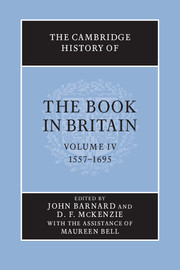Book contents
- Frontmatter
- Dedication
- Contents
- List of illustrations
- List of contributors
- Preface
- Acknowledgements
- Introduction
- RELIGION AND POLITICS
- 1 Religious publishing in England 1557–1640
- 2 Religious publishing in England 1640–1695
- ORAL TRADITIONS AND SCRIBAL CULTURE
- LITERATURE OF THE LEARNED
- LITERARY CANONS
- VERNACULAR TRADITIONS
- THE BUSINESS OF PRINT AND THE SPACE OF READING
- BEYOND LONDON: PRODUCTION, DISTRIBUTION, RECEPTION
- DISRUPTION AND RESTRUCTURING: THE LATE SEVENTEENTH-CENTURY BOOK TRADE
- STATISTICAL APPENDICES
- Abbreviations
- Bibliography
- Index
- Plate Section
- References
2 - Religious publishing in England 1640–1695
from RELIGION AND POLITICS
- Frontmatter
- Dedication
- Contents
- List of illustrations
- List of contributors
- Preface
- Acknowledgements
- Introduction
- RELIGION AND POLITICS
- 1 Religious publishing in England 1557–1640
- 2 Religious publishing in England 1640–1695
- ORAL TRADITIONS AND SCRIBAL CULTURE
- LITERATURE OF THE LEARNED
- LITERARY CANONS
- VERNACULAR TRADITIONS
- THE BUSINESS OF PRINT AND THE SPACE OF READING
- BEYOND LONDON: PRODUCTION, DISTRIBUTION, RECEPTION
- DISRUPTION AND RESTRUCTURING: THE LATE SEVENTEENTH-CENTURY BOOK TRADE
- STATISTICAL APPENDICES
- Abbreviations
- Bibliography
- Index
- Plate Section
- References
Summary
In publishing, as in Church and State, the 1640s and 1650s witnessed massive changes, and in the first part of this section some of the more striking changes will be considered: in broad terms and then through a specific example – the uses to which the Quakers put print in the early stages of the development of that movement. The speed and extent of those changes do, however, need to be kept in perspective: not all works then produced were radical or subversive – many were conservative or even reactionary. Moreover, there were a number of developments which took several decades rather than a few years to reach a peak in the later Stuart period. In the final part of this section some of the continuities between the edifying and instructive works published in the half century before 1640 and those published in the half century after 1640, and especially after 1660, will be discussed. For in the 1690s as much as the 1650s, works on ‘divinity’ comprised half of the output of English presses.
Publishing in the 1630s had been characterized by the production of huge quantities of officially approved publications such as the Authorized Version of the Bible, the Book of Common Prayer, and the version of the metrical Psalms associated with Sternhold and Hopkins, but in the 1640s, owing to jealousies within the print trade and political turbulence, this production was either severely curtailed or brought to an abrupt end. Even the humbler ABC with the catechisme and Primer and catechisme fell under a cloud in the 1650s.
Keywords
- Type
- Chapter
- Information
- The Cambridge History of the Book in Britain , pp. 67 - 94Publisher: Cambridge University PressPrint publication year: 2002
References
- 6
- Cited by



